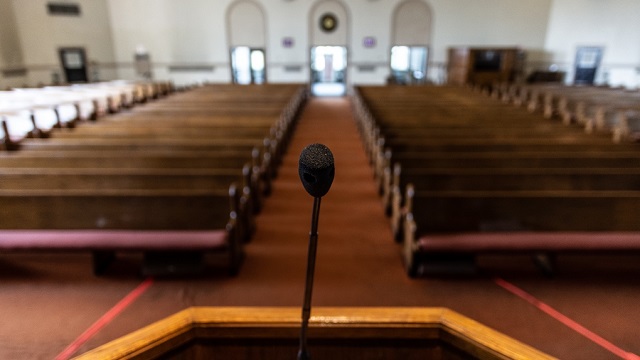Censorship Industrial Complex
“Minority Report”: The Sequel. A warning to the Canadian Church

From the Frontier Centre for Pubic Policy
In the 2002 futuristic movie, “Minority Report,” viewers are introduced to a ground-breaking technology that allows law enforcement to preview a crime before it is committed. Then this determination becomes the basis for the arrest and the sentencing of the “pre-crime” perpetrator.
In a case of life imitating art, on February 26, the Canadian government tabled legislation containing provisions that are eerily like the plot imagined in Tom Cruise’s blockbuster.
The proposed legislation should be of great concern to churches and pastors who may face unprecedented legal exposure if it is passed.
Bill C-63, the Online Harms Act, seeks to “promote online safety.” The Act endeavours, in part, to protect children from online sexual exploitation and requires the mandatory reporting of online child pornography by internet providers. So far, so good.
But the proverbial devil is lurking in the details of the provisions pertaining to online hate speech, which are simply breathtaking.
The Act represents what many consider to be the most dangerous assault on free speech this country has ever seen, prompting Canadian novelist, Margaret Atwood, to refer to the proposed legislation as “Orwellian.”
This bill would not only have a glacial effect on free speech, but it would also trigger an open season on religious organizations that do not align with mainstream dogma.
Here are some of the reasons behind this apocalyptic assessment of this piece of legislation.
The bill defines hate speech as speech that “is likely to foment detestation or vilification of an individual or group of individuals on the basis of a prohibited ground of discrimination.”
This definition is so vague, ambiguous, and far reaching that it could apply to any opinion that diverges from the government-sanctioned media narrative.
The responsibility of judging complaints would be lodged with the Human Rights Commission. This fact alone is deeply worrisome, as the threshold for deciding guilt is much lower in the Human Rights Tribunal than in a criminal court, where a person must be found guilty beyond a reasonable doubt.
Plaintiffs could file their complaints anonymously without incurring any legal costs. Defendants, on the other hand, would be bound to retain legal counsel at considerable expense to them.
Should they win their case, the plaintiffs stand to be awarded up to $20,000. The defendants could be imposed an additional fine of up to $50,000. Should a legal violation be considered to have been motivated by hate, the defendants could also face life imprisonment!
The incontrovertible proof that Bill C-63 is not about protecting children but strangling free speech resides in what is now ironically referred to as the “Minority Report” provision.
As unhinged as it sounds, the legislation states that if a member of the public has grounds to believe that someone is likely to engage in hateful speech, that person can appeal to a provincial judge who may then subject the defendant to house arrest and other restrictions.
Human nature being what it is, there is no telling the number of people who will be incentivized to file complaints knowing they have much to gain and nothing to lose.
Conservative churches would become instant targets in the tsunami of human rights violation initiatives that the proposed legislation would trigger.
In response, churches may decide to play it safe by restricting their services to in-person participation or by self-censuring.
While either choice would no doubt be welcome by a government that wants to silence those who hold “unacceptable views,” to quote Prime Minister Justin Trudeau, such restrictions would no doubt prove to be detrimental to the churches and the common good.
The proposed legislation is not about protecting children. It’s about unleashing the mob against those who would oppose an agenda that is already proving to be an existential threat to liberal society.
Bill C-63 is currently at the nexus of the fight to preserve our most fundamental freedoms, Canadian democracy, and the well-being of future generations.
Churches have a window of opportunity to voice their opposition to this appalling piece of legislation.
What can be done?
First, be informed. Videos posted by the Canadian Constitution Foundation are a great place to start.
Second, promote congregational awareness. Church leaders can no longer pretend that such issues are beyond the scope of their pulpit. To denounce injustice is indeed part and parcel of the church’s prophetic mandate.
Third, church members should contact their member of parliament to express their opposition to Bill C-63.
Canadian churches have historically chosen to remain on the far edges of the culture war currently raging in the Western world. But if Bill C-63 receives royal assent, these same churches may soon unwittingly find themselves in the middle of the very battlefield they so vigorously sought to avoid.
Pierre Gilbert is Associate Professor Emeritus at Canadian Mennonite University.
Censorship Industrial Complex
Canadian bishops condemn Liberal ‘hate speech’ proposal that could criminalize quoting Scripture

From LifeSiteNews
Canada’s Catholic bishops have condemned the proposed amendments to Bill C-9 warning that quoting the Bible in good faith could become punishable by up to two years in prison.
The Canadian Catholic bishops have condemned proposed restrictions on quoting religious texts, which would potentially criminalize sharing Bible passages.
In a December 4 letter to Liberal Prime Minister Mark Carney, the Canadian Conference of Catholic Bishops (CCCB) advocated against proposed amendments to Bill C-9, the “Combating Hate Act,” to allow Canadians to be punished for quoting Scripture.
“[T]he proposed elimination of the ‘good faith’ religious-text defence raises significant concerns,” the letter, signed by CCCB President Bishop Pierre Goudreault, explained. “This narrowly framed exemption has served for many years as an essential safeguard to ensure that Canadians are not criminally prosecuted for their sincere, truth-seeking expression of beliefs made without animus and grounded in long-standing religious traditions.”
Goudreault pointed out that “the removal of this provision risks creating uncertainty for faith communities, clergy, educators, and others who may fear that the expression of traditional moral or doctrinal teachings could be misinterpreted as hate speech and could subject the speaker to proceedings that threaten imprisonment of up to two years.”
“As legal experts have noted, the public’s understanding of hate-speech and its legal implications are often far broader than what the Criminal Code actually captures,” the letter continued. “Eliminating a clear statutory safeguard will likely therefore have a chilling effect on religious expression, even if prosecutions remain unlikely in practice.”
In conclusion, Goudreault recommended that Liberals either scrap the proposed amendment or issue a statement clarifying that “good-faith religious expression, teaching, and preaching will not be subject to criminal prosecution under the hate-propaganda provisions.”
He further suggested that the Liberals “commit to broad consultation with religious leaders, legal experts, and civil liberties organizations before any amendments are made to Bill C-9 that would affect religious freedom.”
“We believe it is possible to achieve the shared objective of promoting a society free from genuine hatred while also upholding the constitutional rights of millions of Canadians who draw moral and spiritual guidance from their faith traditions,” the letter continued.
As LifeSiteNews reported earlier this week, inside government sources revealed that Liberals agreed to remove religious exemptions from Canada’s hate speech laws, as part of a deal with the Bloc Québécois to keep Liberals in power.
Bill C-9, as reported by LifeSiteNews, has been blasted by constitutional experts as empowering police and the government to go after those it deems to have violated a person’s “feelings” in a “hateful” way.
Now, the Bloc amendment seeks to further restrict free speech. The amendment would remove the “religious exemption” defense, which has historically protected individuals from conviction for willful promotion of hatred if the statements were made “in good faith” and based on a “religious subject” or a “sincerely held” interpretation of religious texts such as passages from the Bible, Quran, or Torah.
As a result, quoting the Bible, Quran, or Torah to condemn abortion, homosexuality, or LGBT propaganda could be considered criminal activity.
Shortly after the proposed amendment was shared on social media, Conservatives launched a petition, calling “on the Liberal government to protect religious freedom, uphold the right to read and share sacred texts, and prevent government overreach into matters of faith.”
Already, in October, Liberal MP Marc Miller said that certain passages of the Bible are “hateful” because of what it says about homosexuality and those who recite the passages should be jailed.
“Clearly there are situations in these texts where these statements are hateful,” Miller said. “They should not be used to invoke or be a defense, and there should perhaps be discretion for prosecutors to press charges.”
His comments were immediately blasted by Conservative politicians throughout Canada, with Alberta provincial Conservative MLA and Minister of Municipal Affairs Dan Williams saying, “I find it abhorrent when MPs sitting in Ottawa – or anyone in positions of power – use their voice to attack faith.”
CBDC Central Bank Digital Currency
Can the COVID Scamsters Stick the Landing?

But it’s another thing altogether for those conspirators to follow through on that psyop and actually achieve their desired end goal: the erection of the biosecurity state.
For those of us who managed to maintain our sanity over the last five years, the question is not whether COVID was a psyop—the answer to that question was obvious from the start—but whether the COVID conspirators have accomplished their objectives.
So, where do we stand in 2025? Did the COVID scamsters win?
Lockdowns
One of the intended effects of the COVID psyop was to take the concept of lockdowns and social distancing from the realm of obscure authoritarian fantasy to stone-cold reality.
As I pointed out in my 2020 video on “What NO ONE is Saying About The Lockdowns,” the idea of using school shutdowns, mandatory lockdowns and social distancing as pandemic prevention measures was first floated by Albequerque high school student Laura Glass for her local science fair project. (For those who are interested, she won third place!)
Prior to 2020, the notion of locking down healthy populations to prevent the spread of disease was still pie-in-the-sky fantasy. No government had seriously attempted to impose lockdowns or social distancing on a mass scale and the very thought of mass quarantines and government-imposed, electronically monitored lockdowns would have been laughed off as conspiracy paranoia.
On the other side of the 2020 divide, however, lockdowns became not only thinkable but an essential tool in the biosecurity state’s toolbelt.
Since 2020, for example, we have seen the extent to which lockdowns penetrated the popular imagination reflected in such ideas as “climate lockdowns.” After all, if locking people in their homes worked for a planetary health emergency, why not use it for a planetary climate emergency?
Yet another example of the mindset shift that has occurred over the past five years arrived last week when the UK Covid-19 Inquiry delivered its verdict that the lockdowns the UK government imposed during the scamdemic were “too little, too late“ and that they could have saved 23,000 lives by locking down earlier.
This is, of course, nonsense. Actually, it’s worse than nonsense; it’s nonsense based on made-up numbers from a known liar. As Off-Guardian point out in their (shadow-banned) tweet on the subject:

For those who don’t know, the tweet is referring to this passage from the inquiry’s report:
Professor Ferguson told the Inquiry that in later work which analyzed the impact of restrictions in England: “we explicitly modelled the counterfactual scenario of moving the lockdown of 23rd March back to 16th March, and estimated mortality … would have been reduced by 48%.“ That could have equated to a reduction in deaths in England from 48,600 to approximately 25,600 in the first wave up to 1 July 2020.
“Professor Ferguson” is, lest we forget, Neil Ferguson, the “virus modeller” (or should that be the “Liberal Lysenko“?) from Imperial College London who produced the computer model suggesting that 500,000 Britons were destined for the grave unless the UK government imposed a national lockdown. Ferguson has since walked back that claim and now denies calling for a lockdown at all, but it should be kept in mind that his about-face came after he was caught breaking the UK lockdown restrictions to carry on an affair with his married lover.
This is also the same Neil Ferguson who used his amazing “virus modeling” powers to predict 50,000 deaths from the UK’s 2002 mad cow outbreak (actual number of deaths: 177) and up to 200 million deaths from a potential, theoretical bird flu outbreak (which has yet to arrive).
Ferguson’s projection of what could have resulted if the government had locked down faster and earlier suffers from the same “garbage in, garbage out” tomfoolery as the Club of Rome’s environmental apocalypticism. Keep in mind that the number of people who would supposedly have been saved by a quicker UK lockdown is based on a fundamentally flawed input: the number of people who the UK government assert died of COVID. Those of us who called out the scam from the start have been noting for years that these COVID death tolls are statistical chicanery, since they rely on the fraudulent claim that everyone who died with COVID—as measured by the scientifically meaningless PCR test—had in fact died of COVID.
In other words, Ferguson’s numbers are plucked out of thin air and aren’t worth the paper they’re written on. They should not be taken seriously by anyone, whatever their opinion on the efficacy of lockdowns.
But, as usual, the damage has been done. The controlled establishment media has run their headlines about the lives that could have been saved by earlier lockdowns, and the type of people who still get their news from these mockingbird repeaters will now be more certain than ever that social distancing and quarantining populations is the right thing to do in the event of a declared health emergency.
Chalk that one up as a win for the COVID scamsters.
QR Codes, Vaccine Passports and Digital ID
Even more important to the would-be medical tyrants than the normalization of lockdowns and social distancing, however, was the creation of the technological infrastructure upon which the biosecurity state is enabled. This digital infrastructure includes:
- the QR codes that people were habituated into scanning before being allowed access to or egress from various quarantine zones;
- the vaccine passports that were used to assess compliance with vaccine mandates; and
- the various contract tracing apps and self-quarantine apps that were employed to keep track of citizens as they moved from place to place.
If you’ve read about my recent experience trying to order breakfast in Malaysia, you’ll know that, once again, the COVIDians have been remarkably successful in achieving their objectives. As I found out during that Malaysian sojourn, scanning QR codes to access online menus and using cashless payment systems to pay for purchases is becoming so normalized in certain parts of the world that it can be difficult to so much as order breakfast without a smartphone and cellular service. Indeed, the smartphone has become a virtual prerequisite for participation in the public space, and it was the scamdemic that allowed the shift to 100% dependence on smartphones to take place.
One recent demonstration of this smartphone requirement for participation in public life came from an email I received this week from a Corbett Reporter in Canada. He was trying to send a registered letter to the US via Canada Post but was informed that his addressed envelope alone would no longer do. Instead, he now had to fill out an online form and print off a special tracking number in order to mail the item. Not owning a smartphone, he was out of luck. He would have to go home, fill out the online forms on his desktop, print out the paperwork and bring it back to the post office. He opted not to send the letter, vowing instead to never again mail anything to the US.
Living in Japan as I do, the only surprising part of his story is that Canada held off making this change in their postal system for so long. Japan Post implemented the same electronic system for international mail four years ago. Of course, at that time the COVID border closures and postal delivery issues were used as the excuse for the intrusive new policy. But, given that country after country is now bringing in similar measures, the reality is clear: the change to a computer-dependent postal system is a global directive that was pushed, using the cover of COVID contagion, during the scamdemic. The end result is that one must either carry their smartphone with them at all times or spend extra time at home filling out online forms and printing off paperwork if they want to send mail internationally.
Of course, all of these technological “upgrades” to our daily experience—from the smartphone postal system to the QR code menus to the cashless payment systems—serve the same agenda. They are meant to pave the way toward the apotheosis of the biosecurity state: the consolidation of all our information into a single government-issued digital identity app. Soon, we will be giving the government real-time access to all of our daily movements, transactions and interactions and will be signing in with government-issued digital credentials everywhere we go online and in real life.
In the event of the next scamdemic, the scammers will hardly have to do anything at all. The QR code check-ins, vaccine passport checks and cashless payments will already be so much a part of our daily life that we’ll hardly notice any new scamdemic-related restrictions on our activities.
That’s another win for Team COVID. But they’re not done yet.
Clot shots
Another key goal of the scamdemic, of course, was to fast track government approval of mRNA and DNA “vaccine” technologies.
We know this, of course, because the conspirators told us as much in their own words. Who can forget the October 2019 Milken Institute-hosted discussion on the “Universal Flu Vaccine“? In case you have forgotten, that was the conference in which such luminaries as Tony Fauci and Rick Bright lamented that the poor, beleaguered Big Pharma corporations were going to have to spend billions of dollars and at least a decade of hard work proving the safety and efficacy of their DNA/mRNA injection techniques…unless some health emergency arose to justify the emergency approval of these experimental technologies.
So, were Fauci and Bright and their co-conspirators successful in their fast-tracking task? Did they circumvent a decade of regulatory approval work for their Big Pharma buddies? Well, if the point was to invoke a health emergency to get emergency approval for these clot shot monstrosities, then we need look no further than “Operation Warp Speed” for proof that the COVID conspirators were, in fact, remarkably successful.
And let’s never forget that Trump considers the Warp Speed MAGA jabs to be “one of the greatest things ever in politics or in the military!”
Lest there be any doubt about Trump’s devotion to this technology, let’s not forget that he hosted an event launching his $500 billion AI-pushing “Stargate” project on his third day in office earlier this year, at which Larry Ellison discussed using AI to develop personalized mRNA cancer vaccines. And just two months ago, Bill Gates used his place of honor at a White House banquet to boast that he and Trump were discussing “vaccines and gene editing” in their joint effort to “tak[e] American innovation to the next level.”
But this isn’t just about Trump, and it isn’t just about what’s happening in the US. This is a worldwide agenda. And, if this smattering of headlines from the past few months is any indication, the COVID era has given a gigantic shot in the arm (pun intended) to the clot shot “vaccine” manufacturers:
Experimental mRNA flu vaccine shows superior efficacy against symptomatic illness (just don’t ask about the side effects)
COVID Vaccine Tech May Reduce Disabilities in Snakebite Victims
Personalized mRNA Vaccines Will Revolutionize Cancer Treatment—If Funding Cuts Don’t Doom Them
The Dawn of Personalized DNA Vaccines
And, exactly in line with my reporting in Who Is Bill Gates? there’s this recent report
New Gates-Funded Microneedle Patch Implant Installs Both mRNA and Quantum Dot Markings Into the Body
Yes, it’s safe to say we are now ensconced in the era of genetic intervention masquerading as “vaccines.”
That’s another win for the WHO mafia.
Mission Accomplished?
I could go on. I haven’t even mentioned yet the passage of the WHO’s pandemic treaty or how its provisions actually encourage the work of the bioweapons industry…in the name of “defense” against such weapons, naturally. (A “poor man’s nuke,” anyone?)
But you get the point. Just as it’s difficult to deny that the COVID scamdemic was the biggest psyop of our lifetime, it’s equally difficult to deny that the perpetrators of that scam have been remarkably successful, achieving so many of their 2030 Agenda items in one fell swoop.
So, did the conspirators win?
The answer to this question is even more important than it might seem at first glance. History, as we know, is written by the winners, so if the WHO goons and their string-pullers and paymasters did indeed win, then our grandchildren will grow up learning about the terrible plague that threatened to wipe out the global population in 2020. They’ll read about how some crazy kooks resisted the loving lockdowns of the government and warned against the life-saving vaccines. They’ll truly believe we were only saved by the skin of our teeth thanks to our benevolent masters imposing lockdowns, mRNA clot shots and masks on us all (though they should have locked us down sooner and harder!).
This is why spreading the truth about these events is so vital. We must not let the lies stand. If these lies are written into the history books, then the conspirators really have won.
If you agree with me, share this report (or at least the evidence linked herein) with someone you love.
Like this type of essay? Then you’ll love The Corbett Report Subscriber newsletter, which contains my weekly editorial as well as recommended reading, viewing and listening.
If you’re a Corbett Report member, you can sign in to corbettreport.com and read the newsletter today.
Not a member yet? Sign up today to access the newsletter and support this work.
Are you already a member and don’t know how to sign in to the website? Contact me HERE and I’ll be happy to help you get logged in!
Subscribe to The Corbett Report
-

 Business2 days ago
Business2 days agoCanada’s climate agenda hit business hard but barely cut emissions
-

 Artificial Intelligence2 days ago
Artificial Intelligence2 days agoAI is accelerating the porn crisis as kids create, consume explicit deepfake images of classmates
-

 Business1 day ago
Business1 day agoCarney’s Toronto cabinet meetings cost $530,000
-

 Bruce Dowbiggin1 day ago
Bruce Dowbiggin1 day agoIntegration Or Indignation: Whose Strategy Worked Best Against Trump?
-

 Censorship Industrial Complex2 days ago
Censorship Industrial Complex2 days agoConservative MP Leslyn Lewis slams Liberal plan targeting religious exemption in hate speech bil
-

 Health2 days ago
Health2 days ago23,000+ Canadians died waiting for health care in one year as Liberals pushed euthanasia
-

 MAiD1 day ago
MAiD1 day ago101-year-old woman chooses assisted suicide — press treats her death as a social good
-

 espionage1 day ago
espionage1 day agoDigital messages reportedly allege Chinese police targeted dissident who died suspiciously near Vancouver










